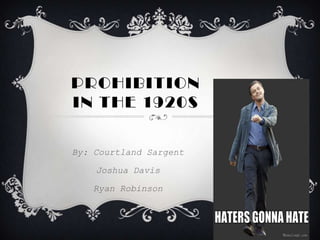Prohibition
- 1. PROHIBITION IN THE 1920S By: Courtland Sargent Joshua Davis Ryan Robinson
- 2. ïķ Lever Food and Fuel Control Act of 1917 âĒ âĒ âĒ âĒ regulated food, fuel, and other commodities Grain shortage Breweries and distilleries closed temporarily 18th Amendment âĒ permanent ban on the sale, transportation, importing, and exporting of alcoholic beverages âĒ Took effect January 17, 1920
- 3. MORE ON THE 18 TH AMENDMENT WHAT SUPPORTERS THOUGHT WOULD HAPPEN: Juvenile delinquency eliminated Crime would drop Dairy & other beverages would prosper. Increase in average workers productivity Increase in nations prosperity Other beverages would replace alcohol Nations Health would improve
- 4. ïķ Everyone broke the law and because of that everyone thought of it as whimsical and unimportant.
- 5. HOW DID IT INFLUEN CE CRIME ïķ To replace the loss of alcohol people made alcohol ïHad a much higher alcohol content âĒ Alcohol was a crime. ï Illegal activity was required to market the illegal alcohol. ïķ Drug use increased ï Took place of alcohol, instead of âdairyâ ï Cigarettes became popular and were deemed fashionable and a sign of rebellion.
- 6. ïķ More jails filled with people convicted of alcohol use or distribution ïķ Enforcement cost millions of dollars. ïķ US District Attorneys spent 44% of their time on Prohibition cases
- 7. MORE ON INFLUEN CE OF CRIME âĒ Became organized and led to the rise of powerful crime syndicates. ï Murder ï Bribery & Blackmail ï Used law enforcement All used to move large quantities of alcohol
- 8. ïķ Over 10,000 people died from drinking wood alcohol. ïķ Others went permanently blind or had severe organ damage.
- 9. AL CAPONE
- 12. ïķ Crime was reduced ïķ Jobs created In liquor industry
- 13. SOURCES CITED ïķ http://www.historicpatterson.org/Exhibits/ExhProhibition.php ïķ http://www.patheos.com/blogs/unreasonablefaith/2009/03/12bad-effects-of-prohibition-you-should-know/ ïķ http://prohibition.8m.com/main_part.html













